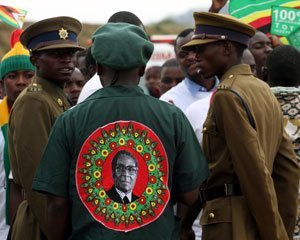
ZANU PF supporters and State security agents contributed to 55% of the major human rights violations in the past six months, a report by a local non-governmental organisation has revealed.
REPORT BY BY TAPIWA ZIVIRA AND PHYLLIS MBANJE
According to a Heal Zimbabwe Trust (HZT) analysis between January and June this year, Zanu PF supporters contributed to 29% of the human rights violation cases in the country.
At least 13% of the violations were attributed to police and intelligence personnel with 10% each to war veterans and soldiers.
Police and army are headed by Commissioner General, Augustine Chihuri and General Constantine Chiwenga respectively and both have vowed that they would not salute anyone without liberation war credentials.
Chihuri has openly said he supports Zanu PF leader, President Robert Mugabe although his position requires that he be apolitical.
HZT communications and research manager, Sitabile Dewa said: “The covert forms of political violence, which are arson, abductions assault, harassment, intimidation and forced rally attendances were in most cases perpetrated by Zanu PF supporters on other members of different political parties, especially MDC-T.
Another emerging trend was that of assault used as a form of punishment on those that are deemed as sell-outs.”
- Chamisa under fire over US$120K donation
- Mavhunga puts DeMbare into Chibuku quarterfinals
- Pension funds bet on Cabora Bassa oilfields
- Councils defy govt fire tender directive
Keep Reading
Dewa said politically-motivated violence was worsened by the intra-party conflicts that emerged during the Zanu PF and MDC-T primary elections held last month.
The other contributors to violations were identified as youths. Zanu PF and MDC-T accounted for 19%, traditional and political leaders 16% and officials from the Registrar General’s Office accounted for 3%.
Reports of increased violence are coming as the country prepares for elections on July 31. The MDC-T has complained that the electoral playing field was not yet level to allow free, fair and credible polls.
MDC-T leader, Morgan Tsvangirai had insisted on sweeping electoral, media and security sector reforms but his quest was doomed when Mugabe proclaimed July 31 as the poll date.
Police, army and veterans of the liberation struggle have often been used as instruments of violence and intimidation in previous elections.
The MDC-T claims 200 of its supporters died at the hands of Zanu PF supporters and state security agents during the violent 2008 elections.
HZT director Rashid Mahiya, whose organisation is running a peace campaign, said: “These elections were supposed to take place in an environment in which reforms that are meant to ensure security of citizens and free participation of everyone have been implemented.”
Meanwhile, a US-based organisation has said the harassment, intimidation and violence perpetrated against civic actors by the government was undermining the credibility of the forthcoming elections.
In a recent report the Robert F Kennedy Centre for Justice and Human Rights (JFK centre) said an atmosphere of intimidation and violence still existed in Zimbabwe.
It attributed this to government’s crackdown on civil society and the human rights community, including arbitrary detention of activists and opposition supporters. Titled, A Promise in Peril: How Widespread Rights Violations Undermine Zimbabwe’s Elections, the report was compiled after a visit by an international delegation organised by the RFK Centre in March 2013.
“The routine intimidation, harassment, and arbitrary criminal prosecutions of human rights defenders, lawyers, and political activists in Zimbabwe threaten the rights of all citizens to participate freely in public affairs,” said Kerry Kennedy, president of the RFK Centre. “With an election upcoming, the government must ensure an electoral environment that is consistent with international standards.”
Kennedy was part of a delegation that also attended the trial of top lawyer, Beatrice Mtetwa who is being accused of “obstruction of justice”.










